
JAPANESE PRINTS
A MILLION QUESTIONS
TWO MILLION MYSTERIES
Ukiyo-e Prints浮世絵版画 |
|
Port Townsend, Washington |
|
TSUKIOKA YOSHITOSHI |
| 月岡芳年 |
| うたがわくによし |
| 1839-1892 |
|
Series Title: Kyokun Zen aku zukai |
|
教訓善悪圖解 |
|
きょうくんぜんあくずかい |
|
"Moral Lessons Through Pictures of Good and Evil" |
|
1880, 11th Month |
|
Publisher: Tsunashima Kamekichi |
|
綱島亀吉 |
| つなかめきち |
|
Size: 6 7/8" x 9 1/8" each |
|
SOLD! THANKS! |
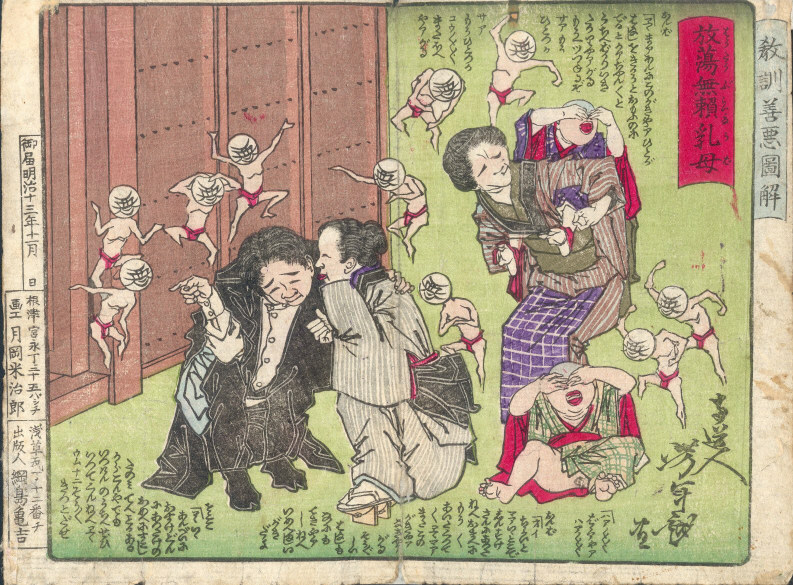
 |
 |
綱 島亀吉 |
||||||
|
Reign Date: Meiji 13, 11th Month |
Tsunashima Kamekichi publisher's mark found in the lower left of each print | |||||||
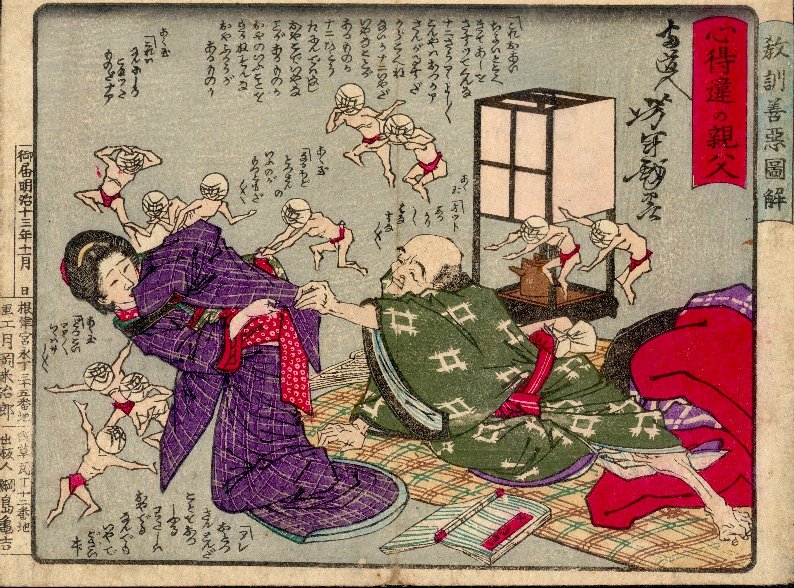
|
GOOD vs. EVIL or WHAT WOULD THE CHURCH LADY SAY? |
|
|
|
I read somewhere that there is a Japanese saying that it is better to receive the scorn of a good person than to be praised by a reprobate. Of course, I can't swear to the accuracy of that maxim because it was a translation of a translation of a translation. However, it runs very close to a quote from Moby Dick where Ishmael reflects that "...it's better to sail with a moody good captain than a laughing bad one." (1) |
|
|
|
YOSHITOSHI DID NOT WORK IN ISOLATION |
|
There is a long traditon in Japanese woodblock prints of the use of these bubble headed figures representing good and evil. In the West there have appeared in movies and cartoons of little angels and little devils, often shown standing on the shoulders of a character, whispering in their ears, urging them to do good or ill. The earliest example I have found so far appears in a pillar print by Choki in the British Museum from circa 1800. (2) |
|
|
|
Below is a detail of a Kunisada print from circa 1832. |
|
|
|
|
|
(1) Moby Dick, by Herman Melville, Quality Paperback Book Club, New York, 1996, p. 72. (2) The Japanese Pillar Print: Hashira-e, by Jacob Pins, Robert G. Sawers Publishing, London, 1982, cat. #836, p. 300. The catalogue entry has a descriptive text: "The struggle of conscience. A girl is trying to detain her lover and two elves are helping her." This is a minor point because we all make mistakes, but there are three little bubble headed demons, not two, helping the girl convince her lover to stay. |
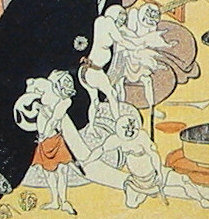 |
All of the details in this section are from prints by Choki at the end of the 18th century or the beginning of the 19th. |
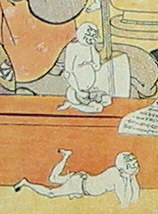 |
|
 |
|||
 |
|||
 |
||
| Above is a detail from a print by Yoshitoshi's teacher Kuniyoshi. |
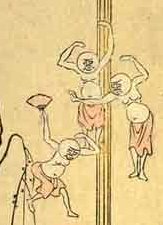 |
|
|
| Eishi detail ca. 1790s. | Detail above from a Yoshifuji child's print ca. 1870. |

 HOME
HOME